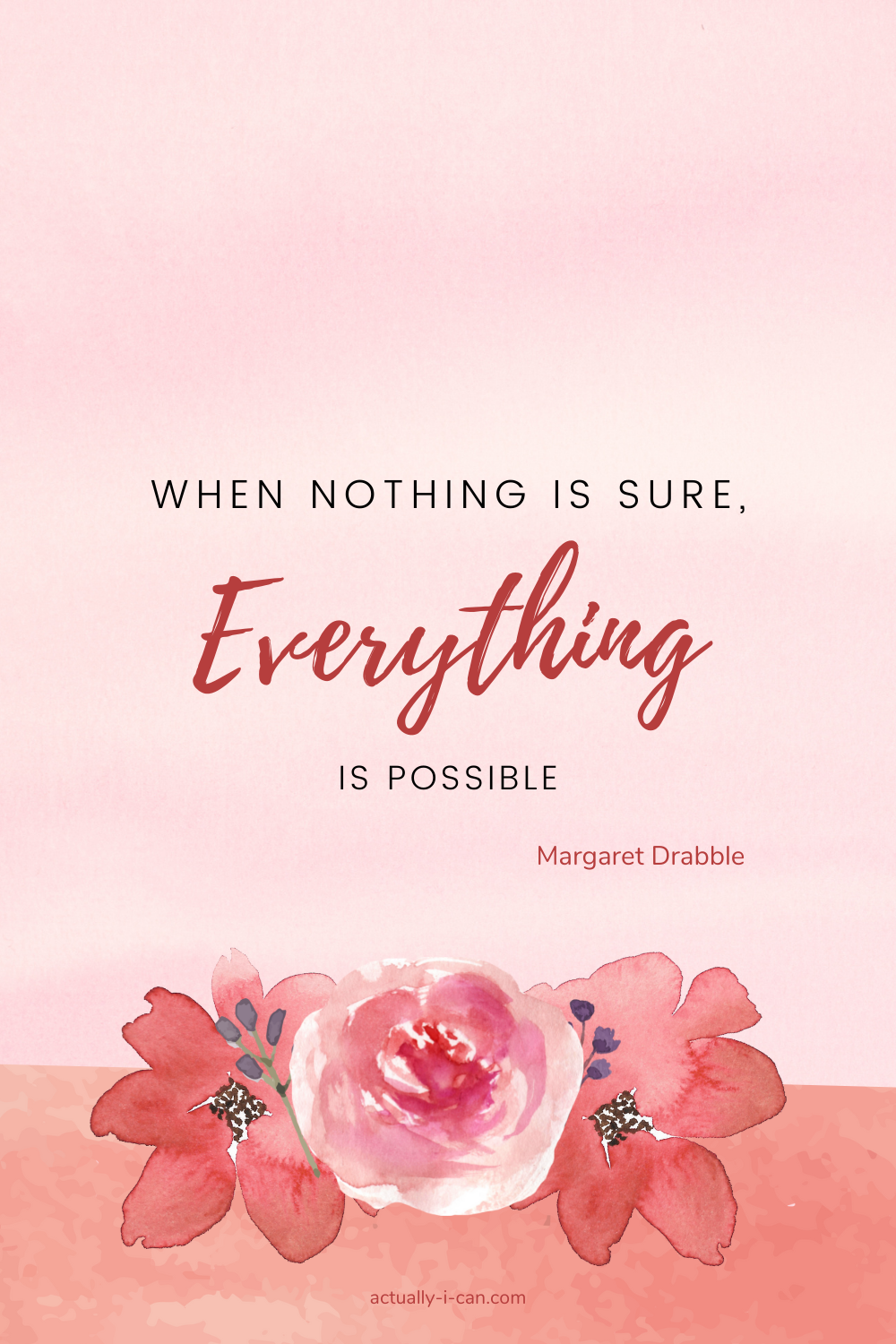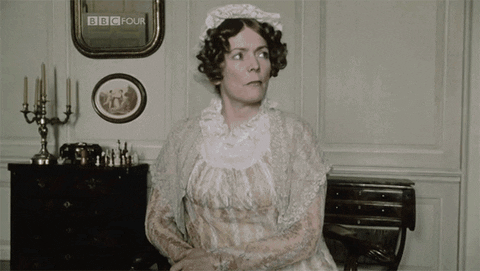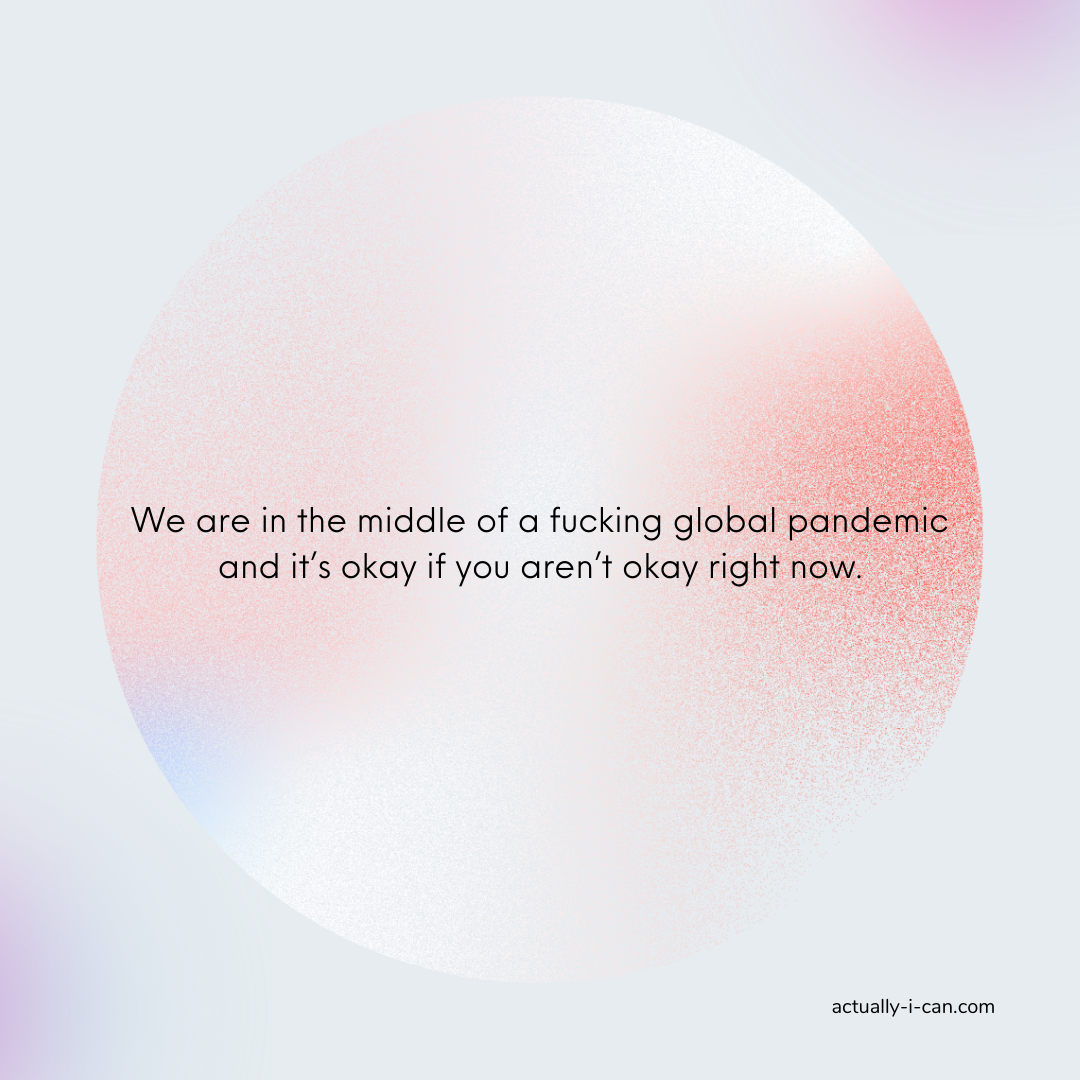When nothing is sure, everything is possible.
Part of the problem with uncertainty is summed up in the title of today’s post, which is a quote from British author Margaret Drabble: “When nothing is sure, everything is possible.”
This saying is a bit of a mixed blessing.
On the one hand, it sounds inspirational! On the other hand, well . . . if anything is possible, that includes a lot of negative possibilities.
As we continue to trundle along with this COVID pandemic, we have all been made aware of just how uncertain things are. We try our best to keep up with shifting science and societal rules, at the same time as we calculate the possible risks to our health, to our pocketbooks, and to those we love.
Now we get to add in the uncertainty of a possible Russian invasion of Ukraine, and what that might mean for world safety, and most especially for the people of Ukraine. It’s all too much.
It is causing all sort of stress and anxiety to pretty much everyone in the world. Even if we aren’t stressed out about anything in particular at a given moment, the fact that everyone we know is stressed or anxious is enough to make us feel the same way.
I’d love to tell you how to “break” that, but I’m not sure we would want to, even if we could. Our connection to others is part of what makes life meaningful, and empathy is an important part of that.
Being able to feel what someone else is feeling is, in the main, not a bad thing. It allows us to know what is going on with others, and to build or strengthen bonds with them.
That said, there are some things you can do to cope with the uptick in uncertainty in everyday living.
First, you can practice acceptance.
This is, at its core, just acknowledging reality.
It can be noticing that you are not, in fact, remotely capable of kicking ass and taking names right now, even if the kicking things part appeals to you. Maybe you have seen Adele’s grief-fueled social media post in which she had to put off her Vegas residency at the last minute because the show isn’t ready and half of the crew has COVID.
If you have, then your reaction may be similar to mine—an immediate wish that you could console her, because her grief and remorse are so raw. You would probably also want to comfort her by saying that OF COURSE it’s okay that everything can’t be done perfectly on time under all the circumstances. Heck, people like Pink weighed in with comments that said just that, and commiserated because they’d been in that position themselves.
It is healthy to accept that the current circumstances are what they are. It could be something external, like needing to homeschool kids again, or dealing with workplace absences, and the feelings that come with that. Or it could be something more personal, like hitting the wall with pandemic fatigue, wobbly mental health, or a spike in anger or irritability.
You’ll note that I didn’t say it’s healthy to be angry or irritable or to have to homeschool your kids. It’s just admitting the reality of what your life is right now that is important.
It’s the ability to notice where you aren’t doing well, and to accept that that’s your current reality, that is healthy. When you notice that you aren’t doing well right now (in any area), it is easier to deal with than when you try to stuff it down and ignore it. In part, labeling your emotions helps you to process them.
By identifying your feelings, it is easier to accept them and process them. It is also far easier to show some compassion to yourself, and to your poor nerves. (Was that a reference to Mrs. Bennet in Pride & Prejudice? Why, yes. Yes it was.)
If you honestly notice that you are exhausted, for example, as a result of pandemic fatigue, perhaps you would give yourself permission to cancel some of the things on your schedule, or take a mental health day, or take a nap, or order delivery for dinner, or go to bed at a decent hour. At the very least, it would likely help you realize that doing ALL THE THINGS, all the time, is not a reasonable expectation for you to set for yourself.
(Let’s face it, expecting ourselves to do ALL THE THINGS! ALL THE TIME! is pretty common. And also completely irrational. We’d be the first to tell someone else that that’s silly/impossible/unsustainable, yet we get upset when we can’t do the impossible ourselves. Maybe we can work on that, hmm?)
There’s no shame in setting simpler goals, or scaling back. Which brings me to the next thing.
Second, shore up your basic selfcare.
I’m not talking about bubble baths and manicures. I’m back to talking about the very basics: sleep, hydration, nutrition, and exercise.
This is legit what I have advised several coaching clients, and it is always a shock to them when they realize how far they are from fine once they start doing this. So many of us are pushing through without enough sleep that we are zombieing our way through life—and of course, lack of sleep makes us prone to accidents or errors, and to being short-tempered and snippy.
And/or we aren’t hydrating enough. Short-term, dehydration can cause fatigue, muscle soreness, and fuzzy thinking. The human body is something like 75% water, so if you aren’t filling the reservoir, you are doing yourself a disservice. Long-term, dehydration can lead to Alzheimer’s disease, kidney infections and UTIs, and more.
If you aren’t taking regular bathroom breaks throughout the day because your bladder lets you know it needs to be emptied, that’s one of the first signs that you aren’t drinking enough water or other fluids. You really and truly aren’t going to win a prize for “fewest bathroom breaks”, unless you consider a massive headache and/or the need to drink cranberry juice and take antibiotics for a UTI to be some sort of prize.
Nutrition is one of those tricky things that I hesitate to go into at length, because I’m not a nutritionist and I’m sure as hell not a weight-loss coach. What I mean by it is a reminder to care for your physical body by giving it the fuel it needs for the day.
If you can manage some fresh foods (the “good stuff”), including some fruits and vegetables, that’s great—but I’m more concerned that you feed yourself and don’t skip meals. If you can do that and also manage to get some of the “good stuff” in there, so much the better. If all you can manage is carbs, but you are eating when you need to, then that’s okay, too. Just don’t let yourself get hangry.
The last thing in my list of basic self-care practices is exercise, which even causes me to roll my eyes some days. I don’t mean you need to drop and give me twenty, or go to the gym, or engage in an official workout of any kind. I legit mean that at a minimum, you need to be sure you’ve stretched and moved around at least bit during the day.
Walking counts. Walking outside counts at least double, since nature is so good for your mental health.
This prior post, entitled Show yourself some love, gives additional guidance.
Finally, do something to regain a sense of control.
Maybe that’s something you accomplish by shoring up your basic needs and creating a new routine to be sure you get the sleep, food, water, and exercise you need. Maybe it’s something you do by reducing your media exposure, or by setting your priorities on a daily basis.
Reducing media exposure
I have a friend who spends quite a large amount of his time monitoring the latest news on the pandemic. What variants, what rates, what masks, . . . you name it, he is tracking it. He listens to podcasts by epidemiologists, checks what’s happening with the CDC, FDA and elsewhere, and even tries to slog through technical reports.
Each day, he posts about his “findings” on Twitter, hour after hour, throughout the day and late into the night. Each day, he gets up and does it again.
This guy isn’t a journalist or an epidemiologist or even a medical professional. He is just an anxious soul who feels like things are out of his control; obsessively educating himself is his choice of “handling” it. The thing is, his actions continue to feed his anxiety and confusion, so he can never relax, and can’t get out of the anxiety spiral he is in.
He’s not getting much else done during the day, due to the obsessive checking of things, so it’s safe to guess that his performance at work is suffering. He has acknowledged that his mental health is taking a hit. In his case, reducing his media exposure would likely help quite a bit, as I’m sure you can agree.
Setting a time limit, or limiting how and when he gets his information, would likely give him time to focus on other things during the day and get some things done.
If you also need to scale back on media, consider limiting your television news consumption to one hour or less per day. If you know that Twitter (or TikTok, or Facebook, or Instagram) is going to be a rabbit hole that sucks you in, at the very least consider unfollowing or blocking any of the accounts that make you feel scared or anxious.
You can do the same for any that send you into comparisonitis, where you feel badly about yourself for any reason after looking at that account. It is 100% okay for you to have a safe, cozy social media bubble that doesn’t cause you massive outrage or cause your mental health to take a hit.
Setting daily priorities
I’ve spoken in person and by email with a number of friends and clients during the past several months about setting priorities. Usually, the conversation starts as a discussion of someone’s “to do” list.
Pre-pandemic, they might jot a list of 15 things, and manage to hit most of them during the day. They are now concerned because they aren’t able to come anywhere near that pace, and often have a tendency to believe that means something is wrong with them.
Turns out, it’s just the state of the world, and we’re all in that same boat. You may have heard the term “pandemic fatigue,” and one of its symptoms is a tendency to hit overload earlier than we did in the “before times.”
Two full years of pandemic issues, including worry about illness, dealing with workplace and other disruptions, and constant risk calculations that none of us is fully qualified or prepared to do have taken their toll on our capacity. In case I didn’t say that clearly enough, diminished capacity is totally normal right now.
When it comes to getting through your list, consider reducing your daily expectation for yourself. Fifteen things may have been possible in the “before times,” but (spoiler alert) it was never reasonable to expect yourself to be able to cope with that many tasks per day, day in and day out, even then.
My advice to clients and friends alike has been to set just three priorities for your day. One of them might be “make sure to drink enough water” (or one of the other items on the basic self-care list). Just put down the three things that you most need or want to get done each day.
If you get those done, then the day is a win, whether you get to any of the other things you’d like to do or not.
If you don’t complete all three, remind yourself that we’re in the middle of a fucking global pandemic and it’s okay if you aren’t okay right now.
Just do the best you can today, and then get a good night’s sleep. Tomorrow is another day.
Want some coaching to help get you through? To help you figure things out, set your priorities, and then do what you can to meet them? That is legit the sort of thing that life coaching helps with. Get in touch with me and I’ll be happy to set up a zoom or phone call so we can figure out if we’re a good fit, and get you signed up for some coaching—whether that’s a single-session fix-up or a package. You can use the contact form or leave a comment and I’ll follow up with you!
Just need some more tips on sleep or dealing with anxiety? I’ve got you! Hit the links I just shared, or head to my books page to purchase one or both e-books. They are on sale!


